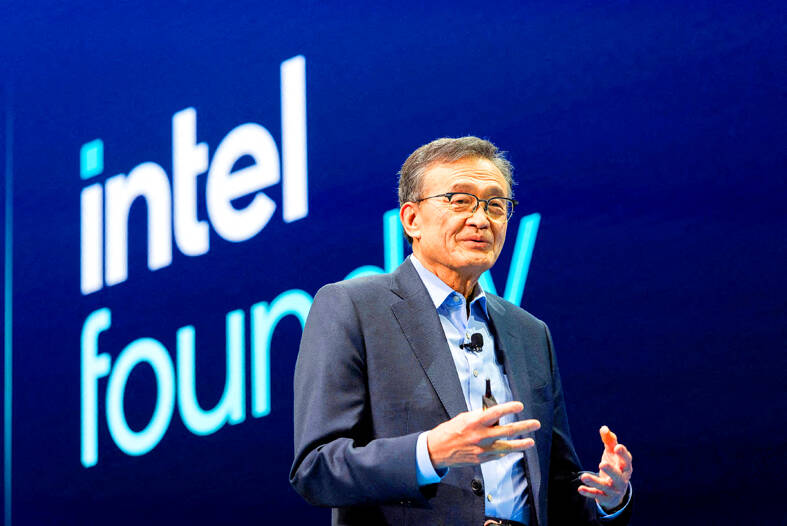US President Donald Trump called for the immediate resignation of Intel Corp’s new CEO Lip-Bu Tan (陳立武), saying he was “highly conflicted” after questions arose about his ties to Chinese firms and sparking doubts over the future of the US chipmaking icon.
“There is no other solution to this problem,” Trump wrote on social media, knocking shares of Intel down nearly 5 percent in premarket trading.
The move comes a day after Reuters reported US Senator Tom Cotton sent a letter to Intel’s board chair with questions about Tan’s ties to Chinese firms and a recent criminal case involving his former firm Cadence Design Systems Inc.

Photo: Reuters
In April, Reuters reported that Tan — himself or through venture funds he has founded or operates — has invested in hundreds of Chinese companies, some of which are linked to the Chinese military.
Tan invested at least US$200 million in hundreds of Chinese advanced manufacturing and chip firms between March 2012 and December last year, Reuters found.
Intel did not immediately respond to a request for comment yesterday.
Tan, who took over the CEO role in March after the ousting of his predecessor Pat Gelsinger late last year, has set a goal of slashing the chipmaker’s workforce to 75,000 people by the end of this year, a reduction of around 22 percent.
Intel also vowed to take a more disciplined approach to manufacturing investment, after it fell behind Taiwan Semiconductor Manufacturing Co (台積電) and Samsung Electronics Co in the made-to-order semiconductor business. The company also has virtually no presence in the booming market for artificial intelligence chips dominated by Nvidia Corp.

IN THE AIR: While most companies said they were committed to North American operations, some added that production and costs would depend on the outcome of a US trade probe Leading local contract electronics makers Wistron Corp (緯創), Quanta Computer Inc (廣達), Inventec Corp (英業達) and Compal Electronics Inc (仁寶) are to maintain their North American expansion plans, despite Washington’s 20 percent tariff on Taiwanese goods. Wistron said it has long maintained a presence in the US, while distributing production across Taiwan, North America, Southeast Asia and Europe. The company is in talks with customers to align capacity with their site preferences, a company official told the Taipei Times by telephone on Friday. The company is still in talks with clients over who would bear the tariff costs, with the outcome pending further

NEGOTIATIONS: Semiconductors play an outsized role in Taiwan’s industrial and economic development and are a major driver of the Taiwan-US trade imbalance With US President Donald Trump threatening to impose tariffs on semiconductors, Taiwan is expected to face a significant challenge, as information and communications technology (ICT) products account for more than 70 percent of its exports to the US, Chung-Hua Institution for Economic Research (CIER, 中華經濟研究院) president Lien Hsien-ming (連賢明) said on Friday. Compared with other countries, semiconductors play a disproportionately large role in Taiwan’s industrial and economic development, Lien said. As the sixth-largest contributor to the US trade deficit, Taiwan recorded a US$73.9 billion trade surplus with the US last year — up from US$47.8 billion in 2023 — driven by strong

A proposed 100 percent tariff on chip imports announced by US President Donald Trump could shift more of Taiwan’s semiconductor production overseas, a Taiwan Institute of Economic Research (TIER) researcher said yesterday. Trump’s tariff policy will accelerate the global semiconductor industry’s pace to establish roots in the US, leading to higher supply chain costs and ultimately raising prices of consumer electronics and creating uncertainty for future market demand, Arisa Liu (劉佩真) at the institute’s Taiwan Industry Economics Database said in a telephone interview. Trump’s move signals his intention to "restore the glory of the US semiconductor industry," Liu noted, saying that

AI: Softbank’s stake increases in Nvidia and TSMC reflect Masayoshi Son’s effort to gain a foothold in key nodes of the AI value chain, from chip design to data infrastructure Softbank Group Corp is building up stakes in Nvidia Corp and Taiwan Semiconductor Manufacturing Co (TSMC, 台積電), the latest reflection of founder Masayoshi Son’s focus on the tools and hardware underpinning artificial intelligence (AI). The Japanese technology investor raised its stake in Nvidia to about US$3 billion by the end of March, up from US$1 billion in the prior quarter, regulatory filings showed. It bought about US$330 million worth of TSMC shares and US$170 million in Oracle Corp, they showed. Softbank’s signature Vision Fund has also monetized almost US$2 billion of public and private assets in the first half of this year,